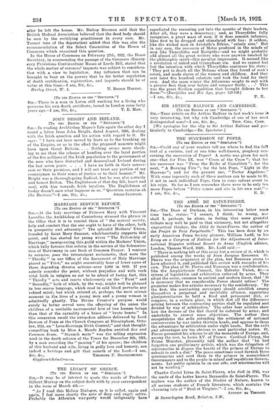1111, LEGACY OF GREECE.
[To THE EDITOR 07 THE '" SPECTATOR."1
Sia,—It may be of interest to quote the words of Professor Gilbert Murray on the subject dealt with by your correspondent in the issue of March 4th :— " As I read this Mellon Dialogue, as it is called, again and again, I feel more dearly the note of deep and angry satire. Probably the Athenian war-party would indignantly have repudiated the reasoning put into the months of their leaders. After all, they were a democracy; and, as Thucydides fully recognises, a great mass of men, if it does commit infamies, likes first to be drugged and stimulated with lies : it seldom, like the wicked man in Aristotle's Ethics, 'calmly sins.' But in any ease, the massacre of Melos produced in the minds of men like Thucydide,s and Euripides—and we might probably add almost all the great writers who were anywise touched by the philosophic spirit—this peculiar impression. It seemed like a revelation of naked and triumphant sin. And we cannot but feel the intention with which Thucydides continues his story : They put to death all the Melians whom they found of man's estate, and made slaves of the women and children. And they sent later five hundred colonists and took the land for their own. And the same winter the Athenians sought to sail with
a greater fleet than ever before and conquer Sicily_ . . This was the great Sicilian expedition that brought Athens to her doom."—(Euripides and His Age, pages 129-130.)
—I am, Sir, &c., P. R.


































 Previous page
Previous page